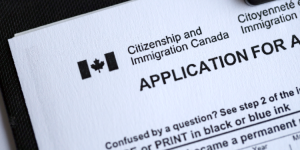
The current COVID-19 health crisis will, according to economists, have lingering economic consequences. What will that mean for the world of work? How easy will it be to find a job abroad in the aftermath of the COVID-19 health crisis?
The world has been brought to a halt. More than a hundred countries have restricted entry on their territories, sales have dropped all around the world, production is dropping and the Organisation for Economic Cooperation and Development (OECD) have predicted that the world's economy will register its slowest growth rates since 2009 due to the COVID-19 crisis. For the common people, it means that prices will likely go up and... there will likely be job losses and difficulty finding a job.
The consequences of the COVID-19 crisis is already being felt in several countries around the world. In the United States, for example, more than 6 million have filed jobless claims since Americans have been asked to stay at home. This is a record. In China, according to the South China Morning Post, 205 million workers have lost their jobs or are unable to find a job right now- and those are just the numbers for the Chinese citizens. The authorities are expecting this situation to carry on for a while the country tries to prevent a second-wave epidemic and is rebuilding itself after most of its industries had stopped working for almost three months.
While the current situation is not looking good, it seems like consequences on the job market will be felt for a while. Indeed, according to the International Labour Organization (ILO), unemployment could rise to up to 24.7 million following the COVID-19 crisis. As a comparison, it is worth noting that unemployment numbers rose by 22 million during 2008's global financial crisis.
Other than unemployment, the ILO also predicts a rise in the underemployment rates after the COVID-19 crisis. This also means a change in working load of those still in employment. Furthermore, it is expected that business will rely more and more on informal employees following this crisis, which means less chances of getting hired abroad.
Relying on the numbers from the World Trade and Tourism Council, the ILO expects that the most affected sectors will be tourism, travel and retail. Indeed, the council predicts a fall of up to 25% in international arrivals during the rest of 2020.
With less of the local workforce being employed, chances for expats to be hired will fall unless for highly specialised skills. While these skills depend on the country, sciences, innovation, artificial intelligence are usually skills in high demand across the planet. For less specialised profiles, hiring expats mean having to meet salary expectations imposed by the country's immigration laws and bear relocation costs, housing, family benefits… This means that it will be increasingly hard to find work outside of one's country after the COVID-19 crisis.



















